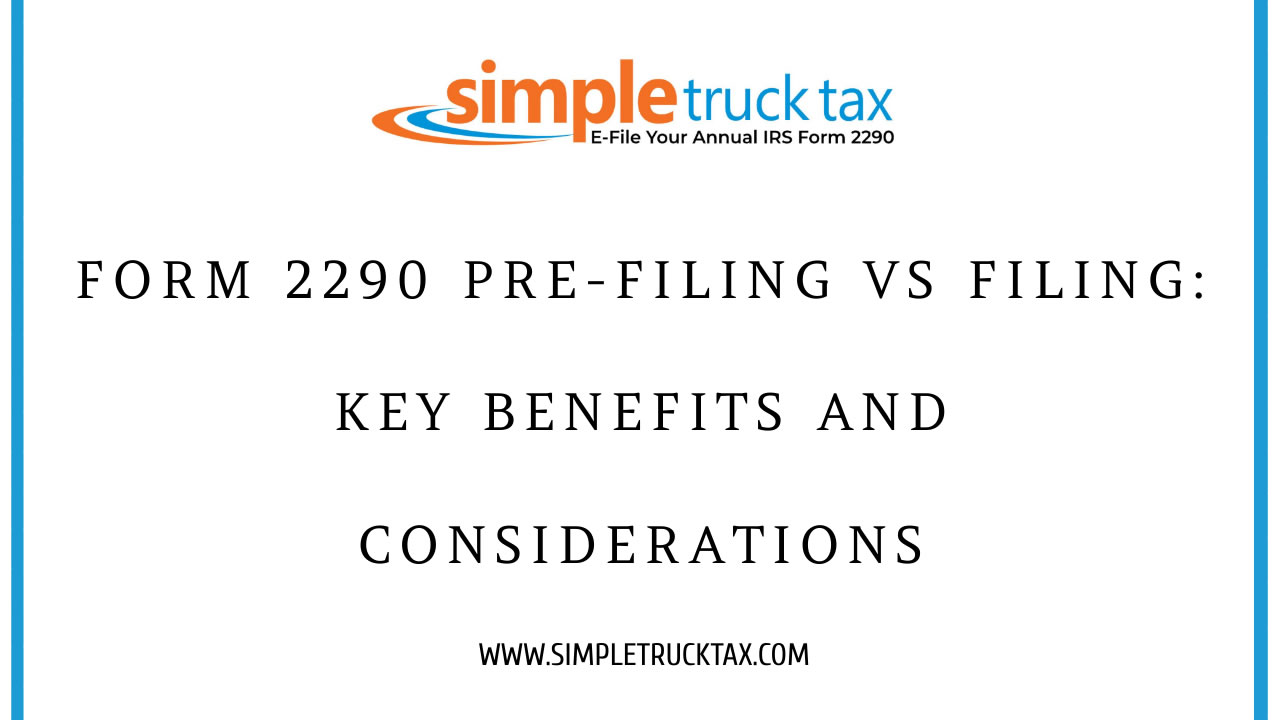
Form 2290 Pre-Filing vs. Filing: Key Benefits and Considerations
Advantages of Form 2290 Pre-Filing vs. Filing
A form known as the Heavy Highway Vehicle Use Tax (HVUT) form, commonly referred to as Form 2290 is an IRS mandatory requirement that truckers operating vehicles carrying tax payable weights of 55,000 pounds or more on public highways must submit it properly and timely filed to avoid penalties. Truck owners can choose pre-filing option which has many advantages over traditional filing. Therefore, this article will explore some of the reasons why you should consider pre-filing rather than filling out Form 2290.
What is Form 2290 Pre-Filing?
Form 2290 pre-filing occurs when a truck owner files their taxes with the Internal Revenue Service (IRS) before the official submission period begins. The IRS usually starts accepting the next year’s tax forms beginning from July 1st and close them on August 31st. The best thing about pre-filling is that it can start even as early as May thereby giving an early start for any lorry drivers.
Benefits of Pre-Filing Form 2290
- Avoiding Last-Minute Rush Pre-filling helps prevent last-minute rush hence good for you. Towards its deadline, there are many filings resulting in delays in processing and other possible issues with IRS systems If you pre-filed your form well before time then chances are high that you will not miss out on deadlines thus avoiding penalties in future.
- Early Payment and Planning Properly done pre-filling process gives one an opportunity plan his/her finances better. By submitting your return earlier makes it easier for one to manage cash flow efficiently while assuring themselves they have enough money reserved for tax liability purposes at all times. Earlier payment also offers peace of mind because your tax obligations have been taken care off in due course.
- Priority Processing The IRS often gives priority to pre-filed forms. As a result, when you file during the peak season, you are likely to get your stamped Schedule 1 indicating payment confirmation faster than if you did not e-file in advance. This is of great advantage to lorry owners seeking vehicle registration renewal or when planning for truck purchases or sale.
- Error Correction If there are problems with your pre-filing, this can be corrected before the deadline pressure hits because it will give more time for correction. Thus, minimizing the possibility of penalties due to mistakes and ensuring that their filing is accurate and complete.
Considerations for Pre-Filing Form 2290
- Changes in Vehicle Information One important thing to consider while pre-filling is that there could be changes in vehicle information between the date of pre-filing and start of tax year as a result of various situations such as buying new vehicles, disposing off old ones et cetera. Therefore, such changes should be incorporated in the process of pre-filling so as avoid any discrepancies.
- Payment Scheduling Although pre-filing allows an earlier submission period, tax payments must begin only at the onset of a tax year. However; some vehicle owners prefer paying after filling it up so that they can simply include it on their financial plan but others don’t see anything wrong with this approach. It’s important to know how and when these kind of payments should be scheduled properly.
- Software and Service Provider Selection It is important one chooses an efficient software or service provider for pre-filing purposes only like customer support service provided by IRS-authorized Softwares among other considerations about reliability . Some firms provide other features including error checks automatically done by systems and reminders which can also be useful tools
Traditional Filing Form 2290 is good for a number of reasons
- Kept Up-to-date This means that all the vehicle information is up-to-date if filing is done closer to the deadline. It is important for truck owners with many changes in their fleet especially in avoidance of wrong filing due to outdated information.
- Immediate Payment This way, some truck owners pay immediately when they file so that it fits into their financial plan and does not require them to arrange payment for future dates, but this also helps them settle the tax liability promptly.
Considerations for Traditional Filing Form 2290
- Delayed Processing or Penalties Thus, when one files towards the closing date there are chances of processing delays or penalties arising in case there are any mistakes made during filing or system errors. High volumes of tax returns can cause the IRS system to slow down thus making it difficult for filers as well increasing stress levels.
- Limited Time Span To Address Errors Moreover, if errors are detected during traditional filing period there remains less chance to rectify before its due date which could lead to fines and more paperwork before resolving issues.
Pre-filing and regular form filling have different advantages and points that must be considered before choosing either of them based on the cost implications, time constraints among other factors. Some of these benefits include; avoiding the last minute rush, better financial planning, faster processing time and ample error correction period are associated with pre-filing. However, it requires careful planning as far as possible changes in vehicle information and timing of payment is concerned. Traditional filing updates the required details while payments happen instantly but may result into postponements or little time left for fixing mistakes.
Every truck owner should assess his/her situation carefully and select an appropriate method of submission according to those requirements. Whether you choose a pre-filed return or a normal one, you have to remember that timely and accurate filling of form 2290 is crucial for achieving compliance and avoiding penalties.
Note: For more information, visit IRS website